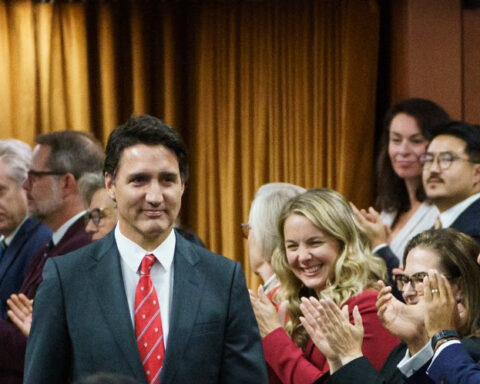Canada could turn into a U.S.-style partisan battleground if its politicians and media don’t mend their ways, says former Conservative MP Chris Alexander.
Alexander, one of the Harper government cabinet ministers defeated in the 2015 election and an unsuccessful leadership candidate, has recently been vocal about the media, politics and the “alt-right” in Canada.
In a Tyee interview he acknowledged extreme right-wing factions were allowed a place in the Conservative party, but predicted that will change as a result of the backlash after deadly racist demonstrations in Virginia last month.
That kind of violence hasn’t hit Canada, Alexander said, and politicians and journalists need to work to make sure it never does.
But Alexander’s attempt to set out the failings of the Canadian media in an opinion piece he wrote for Maclean’s has drawn its own backlash.
Alexander accused the media of viewing Canadian politics through an American lens and inflaming tensions that divide the country.
And he set out what he called false accusations that he was anti-Muslim, linking them to a March 2015 speech by Justin Trudeau at McGill University reprinted in Maclean’s and then repeated “over and over.”
In the speech Trudeau says Alexander stood in the House of Commons and declared a woman’s hijab was “an indefensible perversion of Canadian values.”
“I never said any such thing,” Alexander wrote in the Maclean’s piece. “My wife Hedvig, who is Danish, wore a hijab through seven years in Afghanistan.” Alexander was Canada’s ambassador to Afghanistan from 2003 to 2005 and representative of the United Nations mission in Afghanistan until 2009.
Alexander, defending the Conservative government’s bid to require women to remove their hijabs — head scarves — during citizenship ceremonies, did say “the hijab has been used to cover the face of women… under the terrible influence of the Taliban in places like Afghanistan and Pakistan.”
“Those practices have no place in our citizenship ceremonies, where we insist on confirming the identity and confirming the commitment of new citizens to our laws, to our sovereign, to our values, and to our traditions,” he told the House of Commons.
Alexander’s opinion piece sparked a rebuke from Ottawa Citizen columnist Shannon Gormley.
She said Alexander and other “far-right populists” were trying to “scapegoat elites” for their own failings.
“Adding insult to self-inflicted injuries, perhaps they should be pitied and politely ignored,” she wrote. “Only, in largely blaming others for their own fall just as they blamed them for social decline, populist misopportunists diminish the truth and the social cohesion they claim to desire.”
Failings of media
Alexander told The Tyee the Citizen column highlighted the failings of Canadian media he described in Maclean’s.
The column noted Alexander’s role in the 2015 pre-election announcement of a “barbaric cultural practices tip line” widely panned as anti-Muslim by pundits and political opponents.
But he maintains the tip line plan didn’t reflect bigotry or anti-Muslim sentiments. Alexander said he spoke to victims of cultural practices like forced marriage as he researched the initiative and they used the word “barbaric” to describe their experiences.
Victims even insisted the word be used in the government’s tip line name, Alexander said.
But the media mislead the public, he alleged, painting it as a bigoted policy.
“Literally people go around calling it an anti-Muslim snitch line,” he said. “They are misleading the audience in the most dangerous way. There was nothing exclusive anti-anybody in that legislation.”
Alexander said if he had a dime for every person who referred to the line negatively without mentioning things like “forced marriage” or “honour killings” he’d be a rich man.
Alexander still speaks to the news media. But he said the barbaric cultural practices tip line coverage is the kind of story causing Conservatives to boycott media outlets like the CBC, which they say is biased against them.
While some won’t speak to the CBC, many Conservatives — including Alexander — did speak to the Rebel, a controversial right-wing online media outlet.
Alexander had been interviewed by the Rebel and appeared at the organization’s rallies.
In March he tweeted he would no longer attend Rebel events after a piece by contributor Gavin McInnes entitled “10 things I hate about Jews.”
“We have a responsibility, all of us, to hold media and social media to account to the extent they allow themselves to be platforms for spreading hate,” Alexander said then.
Alexander said he wants to talk to all media, and deciding what organizations he won’t speak to is subject to “constant review.”
He said his philosophy is “talk to everyone, pander to no one” and not to say different things to different outlets.
“I don’t think we should be, as a matter of course, boycotting media just because we disagree with reports that they put out,” he said. “I will continue to talk to the CBC and all the other professional media outlets.”
Alexander said the Canadian media is generally “professional” but declining circulations and audiences are having a noticeable affect on quality.
The downward trend, he said, has many Canadians relying on foreign news services as their go-to source for information.
During his years in Parliament from 2011 to 2015, Alexander said he noticed Canadians were increasingly less interested in consuming news from Canadian outlets.
One result has been the growing influence of the polarized political coverage from the United States, he said. “It crowds out our national story,” he said.
The Canadian media needs to change to avoid the same kind of partisan breakdown, Alexander said.
Media must create a “shared sense of public service,” he said, rather than existing to produce clickbait. Canadians should feel served by their media.
Often Canadian media seem to allow their headlines to be determined by negative attacks from a politician’s opponents, he added.
Reporters can’t allow the spin coming out of someone’s war room to drive their coverage, Alexander said, calling for more in-depth reporting and analysis.
“Let’s put things in the context of real policy.”
Jeremy J. Nuttall is The Tyee’s reader-funded Parliament Hill reporter in Ottawa. This piece was republished under arrangement with the Tyee.




